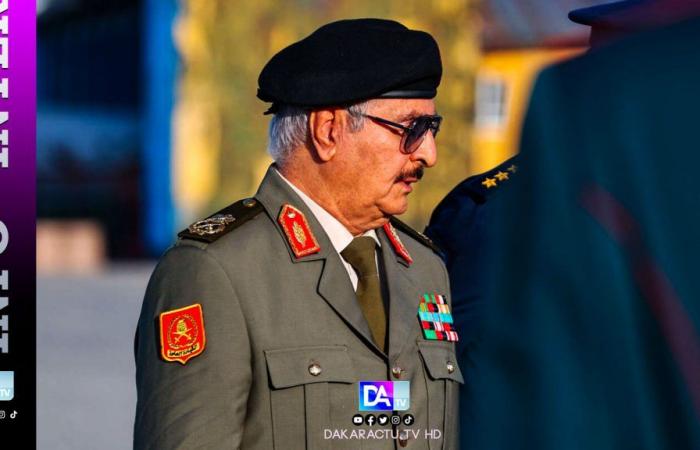The strongman of eastern Libya, Khalifa Haftar, recently promoted his younger brother to the head of his land forces, the latest in a series of promotions of his sons strengthening the clan’s hold on Cyrenaica, at the risk of perpetuating the division of the country.
General Saddam Haftar, 33, took office at the beginning of June as chief of staff of the army within the Libyan Arab Armed Forces (LAAF) commanded by his father.
This appointment, after those of two of his brothers to key positions, reflects, according to experts, a desire by Marshal Haftar, 81, to consolidate the power of his clan in the East and prepare for the next generation.
Undermined by divisions since the fall of Muammar Gaddafi’s regime in 2011, Libya, which has abundant oil reserves, is governed by two rival executives, one in Tripoli (west) recognized by the UN, and the other in the East around the Haftar camp.
Elections supposed to unify the country were scheduled for December 2021 before being postponed indefinitely.
The organization of the presidential election has since come up against the refusal of the Western camp to authorize a soldier and a dual national to run, in this case Marshal Haftar, a Libyan and American citizen.
Before Saddam Haftar, his brother Khaled was named chief of staff of “security units” within the LAAF in July 2023 and promoted to the rank of major general.
And in February 2024, another of Haftar’s six sons, Belgacem, took the reins of the newly created “Libya Development and Reconstruction Fund”, with significant resources at his disposal.
– “Private army” –
The rise of Marshal Haftar’s sons “is part of the continuity of what has, from the beginning, been a private (…) and family army as Haftar consolidated his power”, deciphers for the ‘AFP Wolfram Lacher, researcher at the German SWP institute.
“The inner circle (…) which controls the key units and resources of this private empire are his sons but also his cousins, his nephews, his sons-in-law,” he adds.
From April 2019 to the summer of 2020, Marshal Haftar attempted to conquer the capital with the support of the United Arab Emirates, Egypt and Russia, but his forces were routed.
After this stinging setback, “there was a rapid rise of sons (…) through the military ranks, surpassing in no time what took other officers decades, which attracted them mockery”, underlines Mr. Lacher.
“But since then, by seeing them on social networks every day, the Libyan public has started to get used to them,” he adds.
According to him, Saddam Haftar, the marshal’s most prominent son, holds “military power” but also controls “repression, the management of trafficking, embezzlement of public funds and the negotiation of shady transactions with political rivals in Tripoli “.
For Khaled al-Montasser, professor of international relations at the University of Tripoli, Haftar, who suffered a stroke in 2018, is “stepping up the pace” to prepare for the next generation.
According to him, his foreign allies consider him “unfit to lead Libya”, hence the need to inject “new blood”, says Libyan political analyst Imad Jalloul.
– “Private domain”-
This is “clearly a sign of preparation for the day when Haftar disappears, and when his entire power structure could therefore be in danger”, opines Wolfram Lacher.
While locking in power, the Haftar clan strives to remove, at the cost of brutal repression, any opposition in the East and South where political, tribal and civil society figures are arrested, disappear or are killed, explains Mr. Jalloul.
The latest example, the death in April of activist Siraj Doghman, during his detention on a Haftar military base.
In December 2023, Colonel al-Mahdi al-Barghathi, former Minister of Defense, and several of his relatives, accused by the Haftar camp of being part of a “cell of saboteurs, were arrested and then killed”.
“What is distressing to see in recent months is that Western and UN diplomats have begun to legitimize this family power structure which considers two-thirds of the country and its underground wealth as its private domain, by publicly meeting Haftar’s sons,” notes Mr. Lacher.






